Allergenic Foods: Why Your Pediatrician Isn’t Talking About This with Ron Sunog, MD
- Early reports on allergy reactions and how the guidelines for early avoidance of allergenic foods were created for infants
- How the recommendations for introduction of allergenic foods have changed over the last years
- Reasons why some pediatricians may not be currently recommending the more updated food allergy guidelines for feeding babies
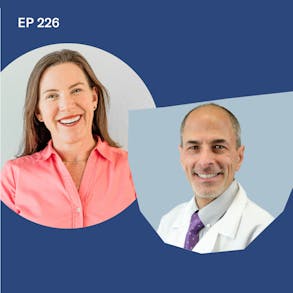
LISTEN TO THIS EPISODE
Episode Description
What if my doctor is not on board with feeding my baby the allergenic foods? How do I know it’s safe to offer my baby peanuts? My doctor said to hold-off on offering any of the BIG 8 allergenic foods to avoid possible allergic reactions! If this is or has been the case, this episode is for you.
In this episode, Dr. Ron Sunog, who is a pediatrician specializing in preventing food allergy with food, joins me to discuss the reasons why some pediatricians may not be putting into practice the newer evidence-based guidelines on early introduction of the big allergenic foods to babies.
About the Guest
- Dr. Ron Sunog is a pediatrician specializing in the prevention of food allergies and a medical advisor to Puffworks.
- He takes a food first approach to food allergy prevention, helping parents and caregivers use real foods to introduce babies to potentially allergenic foods
- Dr. Sunog is the author of "Eat The Eight: Preventing Food Allergies with Food and the Imperfect Art of Medicine"

Links from this Episode
- Puffworks Baby is the company that makes Baby Peanut Butter Puffs and Almond Baby Puffs, great for introducing 2 separate allergenic food categories: peanut and tree nuts.
- Doctor Ron Sunog is a Medical Advisor to Puffworks and I am an affiliate for Puffworks. With my affiliate discount code BABYLED you can check out the Puffworks line of products so CLICK HERE TO SHOP.
- Checkout the Eat The Eight website

- Read Dr. Sunog’s book EAT THE EIGHT BOOK: Preventing Food Allergy with Food & the Imperfect Art of Medicine
- Baby-Led Weaning with Katie Ferraro program with the 100 First Foods™ Daily Meal Plan, join here: https://babyledweaning.co/program
- Baby-Led Weaning for Beginners free online workshop with 100 First Foods™ list to all attendees, register here: https://babyledweaning.co/baby-led-weaning-for-beginners
Other Episodes Related to This Topic
- Episode 125 “Why are False Positive Results in Food Allergy Testing so Common? with David Stukus, MD”
- Episode 180 “Food Allergy FAQ with Ruchi Gupta, MD, MPH”
Ron Sunog episodes:
- Episode 216 “Food Allergy & Kids: What’s New and Notable with Ron Sunog, MD”
- Episode 128 “Introducing Allergenic Foods: Ask Us Anything with Ron Sunog, MD and Katie Ferraro, MPH, RDN, CDE”
Other allergy episodes:
- Episode 124 “Using an Egg Ladder for Babies with Egg Allergy with Carina Venter, PhD, RD”
- Episode 125 “Why are False Positive Results in Food Allergy Testing so Common? with David Stukus, MD”
- Episode 126 “EAT THE 8: How to Use Food to Prevent Food Allergy (...and skip the supplement powder stuff!)”
Resources & Research
- 1 Gupta RS, Bilaver LA, Johnson JL, et al. Assessment of Pediatrician Awareness and Implementation of the Addendum Guidelines for the Prevention of Peanut Allergy in the United States. JAMA Netw Open. 2020;3(7):e2010511. Published 2020 Jul 1. doi:10.1001/jamanetworkopen.2020.10511
- In 2015, the Learning Early About Peanut Allergy randomized clinical trial demonstrated that early introduction of peanut to infants between age 4 and 11 months who were at high-risk for developing peanut allergy resulted in a considerable reduction (81%) of peanut allergy prevalence by age 5 years. https://pmc.ncbi.nlm.nih.gov/articles/PMC7364336/#zoi200420r9
- Common barriers to guideline implementation included practice issues such as lack of clinic time, conducting in-office supervised feeding of peanut, and conducting a peanut sIgE test; pediatrician issues, including knowledge of or comfort with the guidelines and concerns about the newness of the guidelines; and parental issues such as fear of allergic reactions.
- Nearly 70% (68.4%) of pediatricians reported needing additional guideline training.
- Risk assessment of infants for peanut allergy is recommended only in the US, whereas other countries recommend early introduction of peanut for all infants regardless of risk. https://pmc.ncbi.nlm.nih.gov/articles/PMC7364336/#zoi200420r22
- The most common barrier to guideline implementation, reported by 28.7% of pediatricians, was lack of clinic time. This finding is consistent with results of previous research on other guidelines, which has suggested that barriers to implementation include physician knowledge, attitude, and clinical factors such as lack of time or resources

Latest Episodes

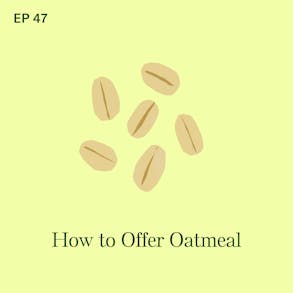

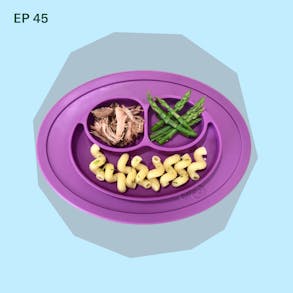
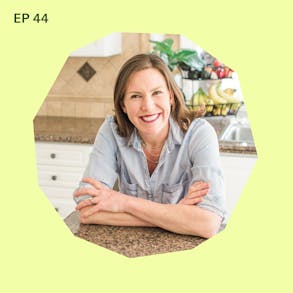
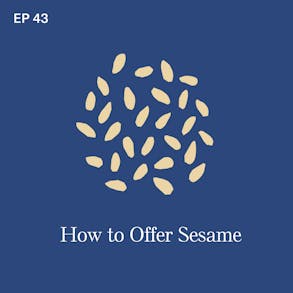
Ron Sunog (1s):
In 2000, the concern for food allergy gets great enough that bad advice is given out. Infants should be kept from the big gay foods.
Katie Ferraro (11s):
Hey there I'm Katie Ferraro Registered Dietitian college nutrition, professor and mom of seven specializing in baby-led weaning here on the baby-Led Weaning Made Easy Podcast. I help you strip out all of the noise and nonsense about feeding, leaving you with the competence and knowledge. You need to give your baby a safe start to solid foods using baby-Led Weaning. Hey guys, welcome back. So dropping this episode at the beginning of may food allergy awareness week is coming up and I'm doing a ton of food allergy content on the podcast in may, as I do every year. So I want to start off the series of interviews about food allergies with Dr.
Katie Ferraro (54s):
Ron Sunog. He is a pediatrician specializing in using food as a way to prevent food allergy in babies. He's also an author of the book called Eat The Eight, that subtitle is preventing food allergy with food and the imperfect art of medicine. So Dr. Sunog has been on the podcast. A number of times, he's a speaker at our baby-led weaning summit. I know him in the context of he's also a medical advisor to the brand Puffworks. So I am an affiliate for Puff works. They make baby led weaning sized puffs that have peanut, and they also have an almond one. So if you're looking for a no mess, low stress way to introduce your baby to peanut protein and separately almond protein, you can check out the puff works.
Katie Ferraro (1m 38s):
Baby puff threat puffworks.com. My affiliate discount code BABYLED works for a discount at puffworks.com. I usually recommend getting a case of baby peanut and a case of baby almond. You do the peanut before the almond because the almond doesn't peanut in it, but we're not here to talk about puffs today. Dr. Sunog is here to talk about pediatricians and he is a pediatrician. And this is an episode about why your pediatrician might not be talking about introducing Allergenic Foods. And one of the reasons why Dr. Sunog wrote his book Eat The Right, which again is about preventing three allergy with food. And the imperfect part of medicine is because he was witnessing this transition a really dramatic transition in the research and the guidelines about the importance of early introduction of Allergenic Foods.
Katie Ferraro (2m 24s):
But noticing that it wasn't trickling down to the actual practice. So in the pediatrician's office, and in this episode, in the interview, he's going to go through some of the data that shows us what we know about pediatricians, not recommending what they should be. And there's a lot of rocket pediatricians who definitely do. We're not bashing the work that pediatricians do by any stretch of the imagination, but there definitely is room for improvement. As far as talking to parents about the importance of using food, to introduce allergenic foods, to babies early and often. So we're going to look a little bit in his interview at a timeline of how guidance has changed, because some of you are still saying like, Katie, my doctor just told me this, that I'm like that's 20 year old guidance. For example, a mom today on a call told me, my doctor said not to introduce egg white until after age one.
Katie Ferraro (3m 7s):
I was like, are you kidding me? That's more than 20 years old guidance and that's changed dramatically. And you actually want to introduce egg white. We have pretty good data at around six months of age and it looks like the protective window might close around 11 months of age. So we don't want to get into the habit of not talking about stuff that we have research that supports. So Dr. Sunog is here to talk about Why Your Pediatrician is not talking about introducing Allergenic Foods. Again, this is Dr. Ron Sunog author of eat the eight.
Ron Sunog (3m 35s):
My pleasure. Good to be with you again,
Katie Ferraro (3m 37s):
You've always got so much valuable information about food allergies, because it is a major concern for parents. And there's always a lot of things changing with regards to the guidance and the guidelines and researches coming out. But we know across the board that not all parents are hearing the message about introducing Allergenic Foods early and often, which is kind of why we're doing this podcast episode today. So you had sent me a timeline kind of, of how origins have changed. And I wanted to ask you about the origins of wrong advice. So a lot of parents listen to this podcast as you know, newish parents, meaning they're not, they probably weren't interested in parenting stuff, let's say 20 years ago. And I remember 20 years ago when I was studying to be a dietitian, the advice and the guidance at the time was things like delay the introduction of egg white until after age one, which of course that's wildly different than what the newer advice and guidance tells us.
Katie Ferraro (4m 28s):
And that's that the early introduction of egg is what appears to be protective against food allergy. So just curious if you could give us a brief synopsis of how allergenic food introduction guidelines for babies have changed over, let's say the past 20 to 30 years.
Ron Sunog (4m 43s):
So the history of the change advice in infant feeding with regard to food allergy basically spans my career. So I've seen the advice change completely, and I still find it interesting, the history of food allergy and medicine. There are written accounts of food allergy that go back at least as far as Hippocrates writings from over 2000 years ago. And there were reports of reactions to food in medical journals that are oldest 400 years, but it wasn't until the early eighties that there was an official recorded case of death from allergic reaction to peanut.
Ron Sunog (5m 23s):
Then in the 1980s and 1990s, we started to see more and more reports. There were four deaths reported in the United States and one in Canada in 1988, there were four more reported in the United States between 1989 and 1992. And then in may of 1990, the British medical journal published a very interesting report of four cases of fatal anaphylaxis. So that severe food allergy reaction. And again, we're talking about peanut because so much of what's in the food allergy, literature and food allergy science and studies. And what people think about is related to peanut.
Ron Sunog (6m 3s):
So in this report in may of 1990, they talked about a 23 year old man who had eaten Chinese food. And the Chinese food had said taste sauce. And that's made with peanuts. And then a 20 year old man who had eaten a meal made with nuts that he didn't realize had nuts. And then a 21 year old man who'd eaten what was called a dried food dressing. And that had nuts in it. And finally, a 15 year old boy who had eaten a piece of cake that was made with nuts. Now, all four of these people knew they were allergic to peanut and they were careful to avoid foods when they knew the food contained peanut, they all four had reactions from eating food that they thought had no peanut and all four died despite intensive medical treatment, the reports themselves were frightening enough, but people were also worried by the implication that if you are allergic to peanut, even if you're careful a life-threatening reaction might be unavoidable and maybe even untreatable, because remember they all did receive intensive medical treatment.
Ron Sunog (6m 60s):
So all through the nineties, people started getting very concerned about peanut and other food allergies, which made medical researchers feel pressured to do something. The Hippocratic oath says first do no harm, but when you're feeling the pressure to do something, sometimes you've listened to that voice that says, don't just stand there, do something instead of first do no harm. So they did something in August of 2000, the American Academy of pediatrics recommended that infants should avoid the Allergenic Foods, even though they didn't have the scientific evidence to back that up. That since COVID, there's been a lot of news about what is backed up by science and what isn't and how people sometimes make decisions, not backed up by science.
Ron Sunog (7m 41s):
The reason for all of this in some sense is pretty simple. We're all human. We don't always make the right decision decision-making is very effected by human emotions.
Katie Ferraro (7m 51s):
Okay. So Dr. Sunog, you get us to 2000. This is right around the time. My first year as a dietician was 2000 and the guidelines were, as you said, recommend avoid Allergenic Foods, even though we had no data to support that. And that's a very important point that you make is that that happens sometimes, especially with the AP recommendations in food and feeding, they'll throw stuff out. They're like, wait three to five days between foods. And there's absolutely no science to support that. And we've covered that in other episodes on this podcast. I just wanted to ask you though, regarding food allergy rates, which are documented in the literature, are food allergy rates higher today than they were 20 or 30 years ago? Or does it just seem like we hear more about food allergies these days? So they're kind of more top of mind.
Ron Sunog (8m 30s):
Yeah. So we definitely hear more about it, but part of why we hear more about it is that the rates of food allergy are definitely going up between 1997 and 2011. And number of children with food allergy increased by 50%. And at this time about 8% of children have some food allergy. What does that mean? Well, picture it this way about two children in every classroom have a food allergy. When you think about it, that that's a lot of kids with food allergy.
Katie Ferraro (8m 57s):
Yes, but also at devil's advocate here, we've had Dr. Sukus on the podcast. A number of times in one of the most downloaded episodes we have with regard to food allergies is an episode he did talking about false positive test results. And that up to about 50% of positive results for food allergy tests are actually false positive. So while it's certainly on the rise, could some of that, the increased by 50% from 1997 to 2011, possibly be due to the fact that there are a lot of false positives in testing. You're more aware of it. You're looking out for it. You're testing for it. There might be a lot more false positives.
Ron Sunog (9m 29s):
Yeah. There's no question about that. Some people who think their children are allergic to foods or think they themselves are allergic are not, and that's because of inappropriate use of a food allergy tests. That's for sure. But having said that, there's also no question given the total numbers, that there is significantly more food allergy now than there was say 20 years ago.
Katie Ferraro (9m 54s):
No, I was just on a parent coaching call with a parent earlier today, a baby that has diagnosed cow's milk, protein allergy, and soy. And she said something about kind of probing on the testing, what sort of tests that you had, where the results should. Oh, and then they also tested for egg and for peanut. And I said, whoa, whoa, whoa. Like I know this baby's history. Why would they test for egg and peanut, if your baby never had an allergic reaction to egg. And peanut said, oh, the doctor just want to give me peace of mind said, well, that actually give you the opposite. If you got a positive test result, your baby never reacts. You should never be testing for that particular Allergenic Foods. And then if it comes back positive, you got to keep in mind that there's a 50% chance that that's a false positive. And so we, I would say anecdotally, one of the biggest problems we see in food allergy testing on food allergy awareness is that a lot of parents are going and getting tests that are not reliable and then unnecessarily cutting out huge categories of foods because they think their baby has an allergy, which is different than actually having an allergy.
Ron Sunog (10m 47s):
Absolutely. It's great that you emphasize that if we could get people to do less unnecessary testing, that would be one of the best things we could do. And you point out another problem. Not only do you end up believing, you're allergic to something, you then avoid that food, maybe have your infant or child avoid that food adversely affecting their nutrition. So that is definitely a, a problem.
Katie Ferraro (11m 10s):
And I know it's on the radar of researchers. I'm in a advanced food allergy course for dieticians taught by Carina Venter and Marion Groetch. And they're talking about this issue of listen across the board, especially with cow's milk protein allergy. You know, it is very, very common for baby to have blood or mucus in the stool very early on during breastfeeding mom cuts it out. Then mom leaves it out forever because she thinks her baby's allergic to cow's milk. Like we have to do a better job of having evidence-based guidelines that direct parents on how to progress and put dairy back into the diet and soy foods, because we know that that helps to protect against food allergy down the road. Cause a big, big group of these were assuming, but they're not truly allergic to cow's milk protein, and yet they're withholding it from the baby's diet.
Katie Ferraro (11m 54s):
So again, it's an issue and it's known, but how do we get the research that then in turn trickles down to practice that parents can follow protocols for being reduction of these foods?
Ron Sunog (12m 3s):
Well, the specific thing you point out, some of that doesn't even require more research. It's funny how, you know, what we're talking about is doctors and giving the right advice specifically with cow's milk allergy and blood in the stool. It seems where we're good at diagnosing that and telling parents to stop giving the infant bell when it's appropriate or breastfeeding mother, you know, not drinking milk herself possibly, but we're not very good at telling them that the infant will outgrow this. We're not good at telling them when they'll outgrow this and we're not good at telling them when they do outgrow it. It's important to add the food back in and the fact that they had a problem with it before is no reason to continue to fear it.
Ron Sunog (12m 43s):
But you know, again, there's so much here about human emotion and how people look for and trust tests and how, when something for blood in the stool, which is far more frightening in an infant than it needs to be than it actually is and how that affects people and how that affects decision-making among parents and doctors.
Katie Ferraro (13m 4s):
So back to the chronological timeline, as you're moving us through the changing guidance, let's talk about 2008 seems to be an important turning point year in the historical timeline. Can you shed light on what was happening in 2008 and then going on to 2015 with the leap study?
Ron Sunog (13m 20s):
Right? So in 2000, the concern for food allergy gets great enough that bad advice is given out. Infants should be kept from the big eight foods. And over the subsequent eight years, it became obvious that his parents followed this advice that no one was being prevented from developing food allergy. And in fact, more children were developing food allergy. So by 2008, the advice that the American academy of pediatrics had given it was clear to them that it was wrong. And so in that year, the American Academy of pediatrics began to tell doctors and parents that avoiding the big eight foods absolutely did not prevent food allergy.
Ron Sunog (14m 1s):
Now I've been in practice since 1988. And I can tell you that most doctors were telling the parents of infants that avoiding the big eight foods helped prevent food allergy way past 2008. They kept giving the wrong advice by the early two thousands, many experts even suspected that feeding the big eight foods could prevent food allergy. Okay? So not only did keeping the foods way, not prevented, but feeding those foods might actually prevent prevented, but they didn't have the evidence. And in this case, I guess it's fair to say good. That new advice was not given out without some evidence that lesson, perhaps we can say it was learned. Then in 2015, the leap study was published.
Ron Sunog (14m 42s):
And that was the first study where someone was able to prove the researchers prove that feeding peanut to infant actually did prevent food allergy. Now experts all over the world are quite clear on the recommendation. Infants should eat the big eight to reduce the risk of developing food allergy and the evidence for this grows stronger practically by the day. Now I've been interested in nutrition and health my whole career. So if I may toot my own horn, I did give the correct advice in 2008. And I published my book Eat The Eight, preventing food allergy with food and the imperfect guard of medicine in the spring of 2019.
Katie Ferraro (15m 17s):
Okay. So let's talk about what advice is being given today. Are doctors getting the message because I know we chat about this all the time, but anecdotally as a dietitian who works with parents at six months, old babies every day, very few of them are at their six month. Well-check at the pediatrician where there's mention of the importance of early introduction of Allergenic Foods starting around the six month mark that's when babies are safe to start solid foods. I know you're a pediatrician, there's a lot of stuff going on at a six month appointment, but is there any data to kind of point the direction of whether or not pediatricians are getting this message and sharing the right advice at the right time?
Ron Sunog (15m 51s):
Yeah. So researchers are doing studies to look at the recommended advice now and how much are doctors following that and giving that advice to parents, the strongest guidelines for introducing the big eight foods. And I keep saying the big eight, that's the name of my book. And officially it's still the big eight, but as you've mentioned, many times there is a ninth now Sesame. So we can call it the big nine. What
Katie Ferraro (16m 14s):
Are we going to change the book title to notch the nine I thought
Ron Sunog (16m 17s):
The nine that's that's my idea. So, so I'm glad we got it out there. So I consider it now trademark that's mine. Anyway. So the studies that look at how we're doing generally refer to peanut introduction guidelines that the national Institute of health put out in 2017 that were essentially based on the leap study. So one study, which was done by a friend of the BLW podcast where she Ruchi Gupta in 2020, her study showed that only 29% of pediatricians were fully implementing the early introduction guidelines. Again, that's a study from 20, 25 full years after leap three full years after the NIH put out specific guidelines.
Ron Sunog (16m 60s):
Another survey from 2021 showed that only 58% of parents said that their doctor had told them anything at all about starting peanut during infancy and fewer than 25% say that they got the advice that was actually along the recommended guidelines. This is really unfortunate because studies show that even with just some parents following the new guidelines, the increase in food allergy has slowed down a lot. And if only more doctors would dispense this advice and more parents would follow it, just think of how much more effective that would be.
Katie Ferraro (17m 35s):
Okay. So Dr. Sunog we have the data, I mean, it's survey data again, anecdotally, I had a parent today in the different live Q and A coaching call I was doing with the group, say that her own doctor said don't introduce egg until after one. I mean, that's like more than 20 year old advice. Like, and I tell those parents like maybe it's time to get a new pediatrician because like, if you haven't even looked at the research about food allergy introduction and you're a pediatrician and you're still giving that advice, I think that it's pretty well established that we should be doing this early and often, but we have also established that. Not all parents are getting that message. And I'm curious, in your opinion, why do you think doctors are not talking about this important issue to parents regarding early and often introduction of Allergenic Foods for Babies?
Ron Sunog (18m 15s):
Yeah, so I actually do talk about this in my book and it really comes down to two things, information overload and psychology people in general today are just extremely overloaded with new information. And this includes doctors because of how much new information is published. And I can't say I keep up with absolutely every new thing that comes out, that every new important piece of information for me, this was always very interesting because when we discovered that we gave out the wrong advice, I mean, that really hits home. I knew that I was among those who gave out the advice that the experts I followed said I should give out and then to correct it in such a simple way.
Ron Sunog (18m 58s):
And I say that as somebody who also loves treatments, that aren't so simple shots that work great, and, you know, any kind of treatment that might be complicated or difficult, et cetera. But here was something so simple, which was at first stop withholding these foods from infants. And then as we had more information feed these foods to infants and you know, that really hit home with me, that's on my radar. It's the kind of thing I pay attention to. So I've been very aware of it all along. The other thing is people in general have a very hard time changing their mind once they strongly believe something and are used to doing something a particular way. So podcasts listeners, sorry if this burst your bubble in any way, doctors are just people too, and doctors have a hard time changing gears.
Katie Ferraro (19m 43s):
Well, Dr. Sunog, I really appreciate your insight on this topic. And again, we're not bashing pediatrician. There's lots of pediatricians and doctors and healthcare providers out there who are staying up on the guidance, but I'm just, especially during food allergy awareness. The month of May we talk a lot about allergies, I'm just continually reminded that there's still a lot of work to be done. So I appreciate the work that you do. I'm going to link to your book, which is Eat The Eight. It's a fabulous book. It's about preventing food allergy with food and the imperfect art of medicine. And I know you wrote this book, not only for parents, but also for practitioners kind of understanding the history of the guidelines and why it's so important that we be talking to parents about using foods to help prevent food allergy and doing it in the right timeframe as well.
Katie Ferraro (20m 25s):
Because again, it does kind of appear that this protective window for food allergy closes somewhere around the 11 month mark, actually, Dr. Stukus is coming back to the podcast to talk about that research, not to scare anyone, but just to let you know that the one thing you can do as a parent with regards to reducing food allergy risk in your baby is to introduce these foods early and often that's, what's supported in the research and the literature, but we know the message is still not getting out there. So thanks for helping to spread the message Dr. Sunog. I really appreciate your time.
Ron Sunog (20m 54s):
You're welcome. And let me just add one more thing. And this is why I titled my book. The way I did the art of medicine is imperfect. Doctors are human. We make mistakes. Advice is sometimes wrong, but the fact that it isn't always correct is not a reason to never listen to it and not follow changes. Science by its very nature gets better with time. That's the way it's supposed to work. So the science is better now and the advice is backed up by evidence. And I just urge people to listen to it, to listen to your podcasts and follow what you're telling them.
Katie Ferraro (21m 31s):
And also to be getting their feeding advice from credentialed healthcare professionals, I always got to put that plug in there as well, because there is so much misinformation out there, especially on social media. And a lot of, you know, we've talked a lot too about the influence of supplement companies and trying to convince parents that they can't feed their babies, these foods, and you need to buy these expensive supplements, subscription models and packages with mix-ins and powders. And you just don't need to do that. Babies should learn how to eat foods by eating the foods, not a supplement program that kind of acts as a bridge to food. We go from milk to food and Babies can eat real food
Ron Sunog (22m 4s):
Well said.
Katie Ferraro (22m 5s):
Well, thanks again, Dr. Sunog.
Ron Sunog (22m 7s):
Thank you.
Katie Ferraro (22m 8s):
Well, I hope you enjoyed that interview with Dr. Ron Sunog. I just love chatting with him because he gets it because he's a pediatrician in practice every day in the office talking to parents like you and me, but he has such a great way of interpreting the current research and the guidelines at making it doable, actionable. So he's a wealth of information about food allergies. And if you want to check out his book, I can't recommend it enough. The book is called eat the eight it's preventing food allergy with food and the imperfect art of medicine. I will link to all of Dr. Sunog previous episodes. Cause he's been on talking about tons of different topics related to food allergy in the past. I'm also going to link to a few of our other most popular food allergy related episodes in the show notes for this episode at blwpodcast.com forward slash 226.
Katie Ferraro (22m 57s):
Thanks so much for listening guys. See you next time.

The Program Baby-Led Weaning with Katie Ferraro
A step-by-step digital program for starting solid foods safely and navigating the original 100 FIRST FOODS™ meal plan with baby-led weaning.
 EXPERT-LED, PROVEN APPROACH TO EATING REAL FOOD
EXPERT-LED, PROVEN APPROACH TO EATING REAL FOOD CONCISE VIDEO TRAININGS TO MASTER BABY-LED WEANING
CONCISE VIDEO TRAININGS TO MASTER BABY-LED WEANING 100 FIRST FOODS DAILY MEAL PLAN WITH FOOD PREP VIDEOS
100 FIRST FOODS DAILY MEAL PLAN WITH FOOD PREP VIDEOS
Baby-Led Weaning for Beginners Free Workshop
Is your baby ready to start solid foods, but you’re not sure where to start? Get ready to give your baby a solid foundation to a lifetime of loving real food…even if you’re feeling overwhelmed or confused about this next stage of infant feeding.
Get baby-led weaning recipes and tips delivered to your email inbox.


